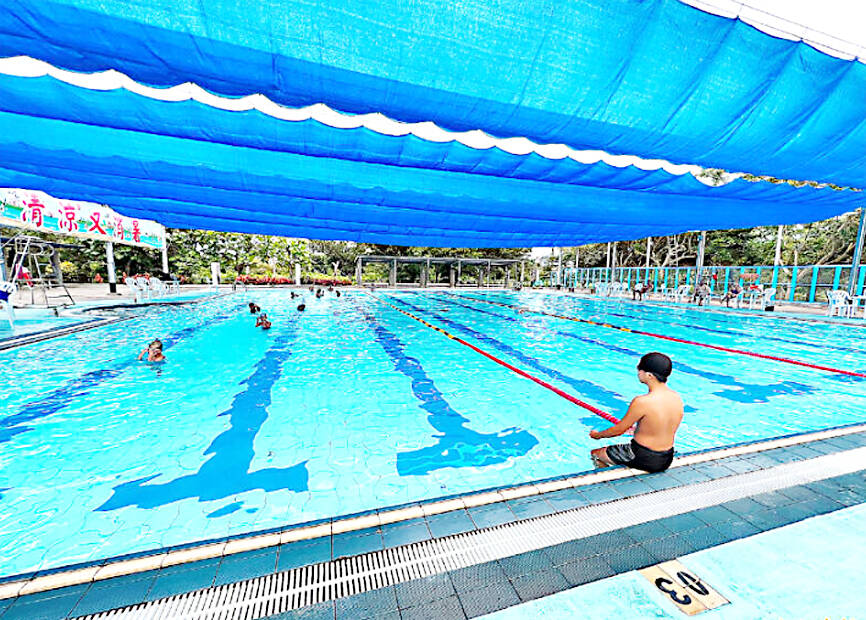Taiwan is having an acute shortage of lifeguards, due to unsatisfactory wages and legal worries, Control Yuan member Fan Sun-lu (范巽綠) said.
Lifeguard examination required for government certification by the Sports Administration which started in 2020, and the administration’s ban of all other tests by the private sector had a role in the shortage, Fan said in a report.
Experts and researchers said the government exam excludes the private sector and costs more, while the pass rate is lower, Fan said, adding that the standards are unrealistic.

Photo: Taipei Times file
The administration, which falls under the Ministry of Education, lacks well-updated data on the situation of lifeguards across the country, as it has conducted one survey targeting lifeguards since 2020, which received 337 responses, she said, adding that 70 percent of the respondents were active while 30 percent had already quit the job.
Lack of job stability, unsatisfactory salary, heavy workload, legal risks and starting another job due to the COVID-19 pandemic were among the reasons given by respondents who quit or have considered quitting, Fan said.
“Pool operators, those businesses needing to watch over swimmers at lakes and the seashore, in recent years had to rely mainly on young student groups who had just obtained certification, to fill the shortage,” she said.
“To deal with the shortage, swimming pool operators, and lake and beach administrations have to rely on young students who have just received their certificates,” she said.
Fan urged the Executive Yuan and the ministry to address the shortcomings and made recommendations.
A new standardized test should be developed for lifeguard certification, and the ministry should delegate the exam to the private sector and inspect those institutions instead of banning them from holding exams, Fan said.
Some developed countries such as the US, Japan, the UK and Australia have examples of private institutions testing lifeguard candidates, Fan said, adding that the Sports Administration’s application virtually turned it into a monopoly and led to the nation’s personnel shortage.
Referring to data showing the majority of deaths caused by drowning taking place at rivers, seas and other bodies of open water, Fan said that the government agency in 2018 standardized lifeguard certification solely based on swimming pool environments.
“The exam mainly focuses on swimming skills and physical capacity, while ignoring practical experience and the ability to quickly adapt to ever-changing factors in open water bodies. It clearly does not meet what a lifeguard’s work requires,” Fan said.
“The Executive Yuan must take action on the issue and coordinate government agencies to conduct a comprehensive review to come up with new regulations which should include improving work conditions, increasing salaries, clarifying legal responsibilities... and revising the certification process, while better protecting lifeguards’ rights to heal the sector and make it sustainable,” Fan said.

Aftershocks from a magnitude 6.2 earthquake that struck off Yilan County at 3:45pm yesterday could reach a magnitude of 5 to 5.5, the Central Weather Administration (CWA) said. Seismological Center technical officer Chiu Chun-ta (邱俊達) told a news conference that the epicenter of the temblor was more than 100km from Taiwan. Although predicted to measure between magnitude 5 and 5.5, the aftershocks would reach an intensity of 1 on Taiwan’s 7-tier scale, which gauges the actual effect of an earthquake, he said. The earthquake lasted longer in Taipei because the city is in a basin, he said. The quake’s epicenter was about 128.9km east-southeast

GENSLER SURVEY: ‘Economic infrastructure is not enough. A city needs to inspire pride, offer moments of joy and foster a sense of belonging,’ the company said Taipei was named the city with the “highest staying power” in the world by US-based design and architecture firm Gensler. The Taiwanese capital earned the top spot among 65 cities across six continents with 64 percent of Taipei respondents in a survey of 33,000 people saying they wanted to stay in the city. Rounding out the top five were Vietnam’s Ho Chi Minh City (61 percent), Singapore (59 percent), Sydney (58 percent) and Berlin (51 percent). Sixth to 10th place went to Monterrey, Mexico; Munich, Germany; Sao Paulo, Brazil; Vancouver; and Seoul. Cities in the US were ranked separately, with Minneapolis first at

The New Taipei City Government today warned about the often-overlooked dangers of playing in water, and recommended safe swimming destinations to cool off from the summer heat. The following locations in the city as safe and fun for those looking to enjoy the water: Chienshuiwan (淺水灣), Baishawan (白沙灣), Jhongjiao Bay (中角灣), Fulong Beach Resort (福隆海水浴場) and Sansia District’s (三峽) Dabao River (大豹溪), New Taipei City Tourism and Travel Department Director-General Yang Tsung-min (楊宗珉) said. Outdoor bodies of water have variables outside of human control, such as changing currents, differing elevations and environmental hazards, all of which can lead to accidents, Yang said. Sudden

Tropical Storm Podul has formed over waters north-northeast of Guam and is expected to approach the seas southeast of Taiwan next week, the Central Weather Administration (CWA) said today. The 11th Pacific storm of the year developed at 2am over waters about 2,660km east of Oluanpi (歐鑾鼻), Pingtung County — Taiwan's southernmost tip. It is projected to move westward and could have its most significant impact on Taiwan on Wednesday and Thursday next week, the CWA said. The agency did not rule out the possibility of issuing a sea warning at that time. According to the CWA's latest update, Podul is drifting west-northwest